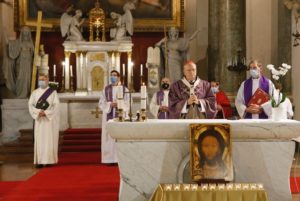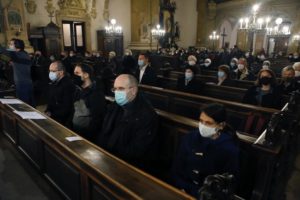Cardinal Peter Erdo, Archbishop of Esztergom-Budapest, celebrated Holy Mass yesterday, Nov. 2, 2020, in the St. Joseph Church of Jozsefvaros, in Budapest, for the souls of the Coronavirus victims and for the recovery of the sick.
In his homily provided to ZENIT English in Italian and translated by ZENIT below, the President of the Hungarian Bishops recalled: «This year we offer the evening Holy Mass of the Day of the Deceased for all those people who died in our country from the COVID epidemic.»
«This year we offer the evening Holy Mass of the Day of the Deceased for all those people who died in our country from the COVID epidemic.»
However, he underscored that during this special Mass –celebrated following all COVID19 prevention protocol and social distancing–«we also pray for our sick, for our relatives and for all those that, as a consequence of the pandemic, have to bear special burdens.»
«This autumn’s second wave,» the prelate admitted, «implies grave physical, material and spiritual tests for many,» before reflecting on the lives of some of the archbishops «who have preceded us, from the point of view of the faith lived and of vocation.»
Cardinal Erdo reminded that it is a work of mercy to pray for the living and the dead, noting that to pray for the deceased has been a habit of the Christian community since its origins. «We believe that he who at the moment of death is in a state of grace, but is still in need of purification, can be helped by our prayers to reach salvation soonest,» he said.
«The most grandiose and most effective form of prayer,» he reminded, «is the Eucharist. Rendered present on such an occasion is Christ’s sacrifice of the cross. It is He who has redeemed me. It’s because of Him that, fastening ourselves to Him, we can have a free way to eternal happiness. That is why we offer Holy Mass for our dead.»
«Eternal rest grant unto them, Lord, and let perpetual light shine upon them! Amen!» Cardinal Erdo concluded.
Here is the full text of the homily, translated by ZENIT:
***
Cardinal Peter Erdo’s Homily for the Commemoration of the Deceased
in the Parish Church of Saint Joseph of Jozsefvaros, Budapest
02.11.2020
Here is a ZENIT English translation of the Cardinal’s unabridged homily.
Dear Brothers in Christ!
( 1) This year we offer the evening Holy Mass of the Day of the Deceased for all those people who died in our country from the COVID epidemic. But we also pray for our sick, for our relatives and for all those that, as a consequence of the pandemic, have to bear special burdens. This autumn’s second wave implies grave physical, material and spiritual tests for many. It’s also an occasion to reflect on the life of some of the Archbishops who have preceded us, from the point of view of the faith lived and of vocation.
(2) Two hundred and eleven years ago Charles Ambrose of Habsburg -Lorena died, grandson of Maria Theresa of Habsburg, son of the brother of Francis I of Habsburg, Emperor and King of Hungary. He was born in 1785 in Milan and received at Baptism two names of the most famous holy Bishops of this city, Saint Ambrose and Saint Charles Borromeo. He was ordained priest at 22 in 1807, and appointed Archbishop of Esztergom by Pope Pius VII on March 16, 1808, obviously granting him the licence of the limit of age relative to the episcopal degree of the Sacrament of Holy Orders.
No sooner he was installed in his diocese, the Napoleonic War also reached Hungary and the young Prince-Primate had the task to take part in the organization of the army of the regions, which would oppose the French. In the battle of June 14, 1809 at Gyor, the Hungarians were defeated. The Primate set up hospitals for the wounded soldiers. But he began to organize and provide not only the necessary things, but he also visited the sick, bringing them spiritual comfort. In this circumstance, he was infected by typhus, which caused his death on September 2, 1809 at 23 years of age.
(3) Considering his brief life, we might have the impression that because of his royal lineage, he had enjoyed privileges and that others had planned his political career for him. However, Providence had another destiny for him, and in this he himself assumed a personal role. If he had maintained a sovereign’s distance in regard to the needy, the mutilated and the sick, perhaps he would have been able to live a long life. But he decided to follow Christ’s teaching. In fact, on Judgment Day, as Jesus himself teaches us, we will not be asked what our lineage was, and what was the rank we obtained during our life, but the voice of the Eternal Judge will be heard: “I was sick and you visited me” (Matthew 25:36). It’s because of this that our ancestors believed: those that visit and care with faith and charity the contagious sick and are infected by the sickness and die, in the wide sense of the word, are martyrs, because they give their life out of love. However, the canonization of a person with the title of martyr requires that in his martyrdom a persecutor or a tyrant had a part, or some hired assassin caused his death. Therefore, we can rightly consider martyrs the Catholics killed in Nice last week, because they were killed deliberately, out of hatred of the faith. Instead, persons who die of sicknesses at the service of the Christian virtue of charity to their neighbour, as Pope Benedict XVI writes, are to be considered martyrs only in the widest sense, but not in the narrowest <sense> of the word, in keeping with the practice of the Church. In these cases, in fact, death is not caused by a free human action on the part of a persecutor, but rather by infection. Whatever the testimony of the young Archbishop of Esztergom is called, it is certain that during his brief life and with his own life, he gave example of Christian charity that helps and has exercised the works of mercy. According to Christ’s teaching, these are the things that will count when the Almighty will assess of our life.
(4) In the last two hundred years medical science has made great progress, we know a lot about the nature of infections. The example of Archbishop Charles Ambrose invites us not to set aside the mandatory caution, but helps us to concentrate on the essence of things. In the present circumstances, we must do everything we can for those in need of our help. Let us support our dear ones that find themselves in a depressed material situation. Let us seek to make easier the life of those that are collapsing under the weight of so much work that has suddenly been thrust on them. It’s important for all and it means carrying out a true act of mercy, if we observe the cautionary rules in order not to expose others’ health to danger. Let us think: the sickness of an individual can ruin the life of entire families.
(5) We recall particularly today the two works of mercy. The first is: to bury the dead. This was also anciently more than a health tradition; it meant rendering honour to man created in the image of God. According to our Christian faith, the body of a baptized person is the temple of God. Therefore, we take leave of our loved ones in the ambit of an ecclesiastical rite. And it’s also for this reason that we visit their graves.
However, it’s also a work of mercy to pray for the living and the dead. To pray for the deceased has been a habit of the Christian community since its origins. We believe that he who at the moment of death is in a state of grace, but is still in need of purification, can be helped by our prayers to reach salvation soonest. The most grandiose and most effective form of prayer is the Eucharist. Rendered present on such an occasion is Christ’s sacrifice of the cross. It is He who has redeemed me. It’s because of Him that, fastening ourselves to Him, we can have a free way to eternal happiness. That is why we offer Holy Mass for our dead.
Eternal rest grant unto them, Lord, and let perpetual light shine upon them! Amen!



